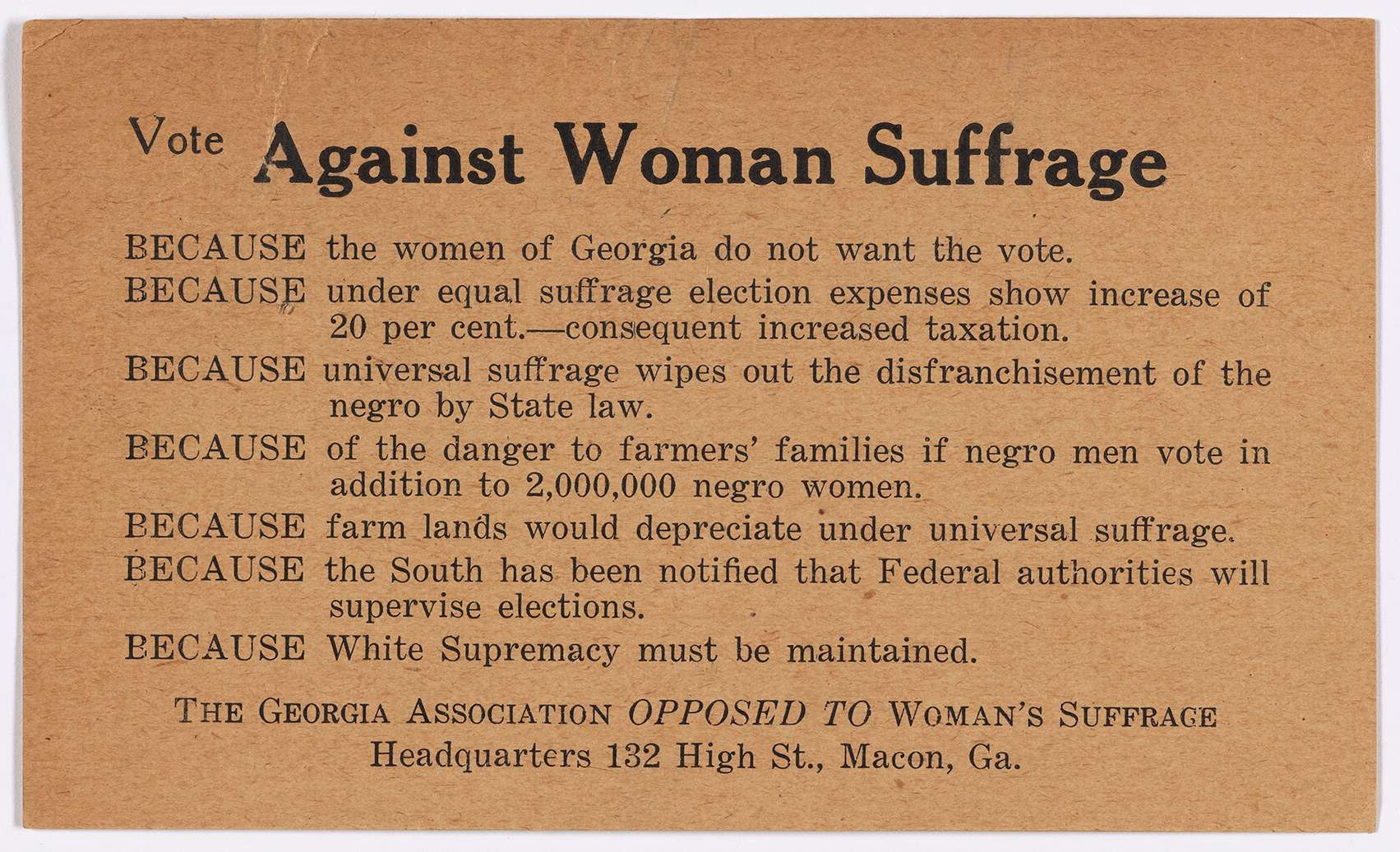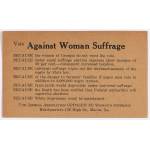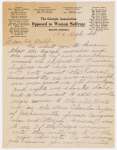Postcard from the Georgia Association Opposed to Woman's Suffrage
ca. 1915
Add to Favorites:
Add all page(s) of this document to activity:

Add only page 1 to activity:
Add only page 2 to activity:
Add only page 3 to activity:
Add only page 4 to activity:
Add only page 5 to activity:
Add only page 6 to activity:
As the women's suffrage movement grew in the early 20th century, varying motives in different regions of the country fueled an organized anti-suffrage movement. Many groups grew out of fears about women’s collective political power as a voting bloc. In southern states, anti-suffragists resisted enfranchising women because they did not want Black women to vote. Reasons for opposition, including "Because White Supremacy must be maintained," are outlined in this card, sent from members of the Georgia Association Opposed to Woman Suffrage to the 64th Congress.
Included with this postcard is a letter from the Georgia Association Opposed to Woman's Suffrage explaining that "the majority of our southern women are opposed to Woman Suffrage" because "We are sure our southern men grant us all priveleges and rights we should have and do not want to add a million negro women to the electorate." Also included is an article written by Caroline Patterson, President of the Georgia Association Opposed to Woman Suffrage and author of the enclosed letter, entitled "The Places Assigned to Men and Women."
This document uses the term "negro" to refer to Black people, which was commonly accepted in that era, but is outdated and inappropriate today.
Included with this postcard is a letter from the Georgia Association Opposed to Woman's Suffrage explaining that "the majority of our southern women are opposed to Woman Suffrage" because "We are sure our southern men grant us all priveleges and rights we should have and do not want to add a million negro women to the electorate." Also included is an article written by Caroline Patterson, President of the Georgia Association Opposed to Woman Suffrage and author of the enclosed letter, entitled "The Places Assigned to Men and Women."
This document uses the term "negro" to refer to Black people, which was commonly accepted in that era, but is outdated and inappropriate today.
Transcript
Vote Against Woman SuffrageBECAUSE the women of Georgia do not want the vote.
BECAUSE under equal suffrage election expenses show increase of 20 per cent.- consequent increased taxation.
BECAUSE universal suffrage wipes out the disfranchisement of the negro by State Law.
BECAUSE of the danger to farmers' families if negro men vote in addition to 2,000,000 negro women.
BECAUSE farm lands would depreciate under universal suffrage.
BECAUSE the South has been notified that Federal authorities will supervise elections.
BECAUSE White Supremacy must be maintained.
THE GEORGIA ASSOCIATION OPPOSED TO WOMAN'S SUFFRAGE
Headquarters 132 High St., Macon, Ga.
Post Card
President
MISS CAROLINE PATTERSON
Macon, Ga.
Recording Secretary
MRS. B. F. SUTTON
Chairman Membership
MRS. R. J. TAYLOR
Chairman Press Committee
MRS. WALTER D. LAMAR
Honorary Vice-Presidents
MISS MILDRED RUTHERFORD
Athens, Ga.
MRS. T.O. CHESTNEY
MRS. WALTER D. LAMAR
MRS. HENRY McHATTON
MRS. E. EUGENE COX
Camilla, Ga.
MRS. JAMES BLOUNT
Vice-Presidents
MRS. RICHARD CUYLER KING
MRS. ORRIN MASSEY
MRS. E. J. PEACOCK
Corresponding Secretary
MRS. S. C. MOORE
Treasurer
MRS. FLEWELLEN HOLT
Executive Board
MRS. WALTER GRACE
MRS. BRUCE JONES
MRS. E. W. GOULD
Mrs. G. P. GOSTIN
MRS. GRANT FULLER
MRS. JACK LAMAR
MRS. B. DOUGLAS FEAGIN
MRS. FRANC MANGUM
MRS. LLEWELLEN HILLYER
MRS. W. T. MORGAN
MRS. PATRICK GAMBRELL
MISS ANNA BRYANT
MRS. F. HOLMES JOHNSON
Gray, Ga.
The Georgia Association Opposed to Woman Suffrage
Macon, Georgia
132 High St.
Dear Mr. Webb, -
We want you to know that the Georgia women and the majority of our southern women are opposed to woman suffrage and hope your committee will vote against the Federal amendment. We are sure our southern men grant us all the privileges and rights we should have and do not want to add 2 million negro women to the electorate and as the Hon. Charles Cooper of Jacksonville, former Congressman and Attorney-General, said to me, "If the negro women vote, they will see to it the negro men vote." We have many good reasons for our opposition
[letterhead]
and have organized the state association, of which I am president. Should it be granted the minority, not the majority would be pleased.
Virginia and Georgia are organized and will soon be joined by Texas and Alabama.
My aunt, Mrs. J. J. Cobb, formerly Miss Annie Laurie Mallory once lived in Shelby; perhaps you knew her family.
Respectfully,
Caroline Patterson
[Large font bolded title]
THE PLACES ASSIGNED TO WOMEN AND MEN
Extracts from an article written by President Grover Cleveland on the subject of woman suffrage.
It is a mistake to suppose that any human reason or argument is needful or adequate to the assignment of the relative positions to be assumed by man and woman working out the problems of civilization. This was done by a higher intelligence than ours. I believe that trust in Divine wisdom, and ungrudging submission to Divine purposes, will enable dutiful men and women to know the places assigned to them, and will incite them to act well their parts in the sight of God. It should also be easy for such as these to see how wisely the work of human progress has been distributed, and how exactly the refining, elevating influence of women, especially in her allotted sphere of home and in her character of wife and mother, supplements man's strenuous struggles in social and political warfare In actual war it is the men who go to battle, enduring hardships and privations, suffering disease and death for the cause they follow. They are deservedly praised for bravery and patriotism. It is the mothers, wives and maids betrothed who neither following the camp nor fighting in battle, contribute at home an army of woman's constancy and love, whose yearning hearts make men brave and patriotic. They teach from afar lessons of patient fortitude and transmit through mysterious agencies to soldiers in the field, the spirit of endurance and devotion. Soldiers who have fought, and those who praise or eulogize them, never forget to accord to woman the noble service of inspiration she has thus wrought, with womanly weapons wielded in her appointed place.
Woman's Truest Influence in Politics
So in political warfare it is perfectly fitting that actual strife and battle should be apportioned to man, and that the influence of woman, rediating [sic] from the homes of our land, should inspire to lofty aims and purposes those who struggle for the right. I am thoroughly convinced that woman can in no better way than this use fully serve the cause of political betterment, and preserve her present immeasureable power of good. It is sane intelligence, and not sentimental delusion, that discovers between the relative duties and responsibilities of man and woman as factors in the growth of civilization, a natural equilibrium, so nicely adjusted to the attributes and limitations of both that it cannot be disturbed without social confusion and peril. It is, therefore, not surprising that a multitude of good American men and women, who certainly are not lacking in solicitude or their country's welfare, are troubled lest this equilibrium should be jostled out of balance by the dissemination of notions which present a distorted view of the saving grace of womanhood as a constructive influence of a potent force in our homes, and in the moral activities of our nation. These good people believe that this saving grace cannot be protected and perpetuated in its ordained beauty and strength, except by protecting and perpetuating in their ordained loyalty and purity all the distinctive traits and attributes of woman's nature. They repudiate the idea that these things have been out-run by advance and progress and are no longer worth saving. On the contrary, their patriotic thoughtfulness and clear intelligence lead them to see that, now and for all time to come, the work and mission of women within the sphere to which God has adjusted them, must constitute the immutable and unchangeable foundations of all that human enlightenment can build.
False Doctrines Taught By Certain Women.
None of us can deny that we have unhappily fallen upon a time when doctrines are taught by women, and to women, which tend with more or less directness to the submersion of sane and wholesome ideas of the work and mission of womanhood and lead to a fanciful insistence upon sharing in the stern rugged and unwomanly duties and responsibilities allotted to man. As is usually the case when a radical and unnatural change is the object of effort, those most extreme and pronounced in opinion have forged to the front and assumed leadership. In outspoken discontent with the station and opportunity American women now enjoy, these clamorous leaders openly demand their equal participation with men in the right of suffrage and in every other political right and privilege. Many other women, more considerate and conservative, who refuse to indorse [sic] these demands, nevertheless by amiably tolerating them, or by advancing other less direct attempts to enlarge the character of woman's endeavor, encourage and aid, perhaps unconsciously and unintentionally, female suffrage radicalism.
An encouragement to those who propagate the doctrine of woman suffrage grows out of their reliance upon the chivalric consideration which the men of the country, in the halls of legislation and everywhere, have for the female sex. A woman speaking in opposition to female suffrage before a senate committee a few years ago said: "It is not the tyrrany but the chivalry of men that we American women have to fear. The men of American [sic] want to give us everything we really want; and the danger is that the will of the minority may be mistaken for the majority. A distinguished writer in dealing with question declared: 'A woman has the inalienable right of attacking without being attacked in turn. She may strike, but must not be struck either literally or figuratively.
This is precisely as it should be--especially when women are within the sacred precincts of womanhood. But after all is said or conceded, the question remains, whether, when a woman deliberately breaks away from womanly environments and enters the arena of challenge and disputation, man's duty and reason should be silenced in deference to her demands and his mental forces given over to easy-going and undutiful gallantry.
One Delusion of Woman Suffrage.
I have sometimes wondered if the really good women who are inclined to approve this doctrine of female suffrage are not deluding themselves with purely sentimental views of the subject. Have they not in some way allowed the idea to gain a place in their minds that if the suffrage were accorded to women it would be the pure, the honest, the intelligent and patriotic of the sex who would avail themselves of it. If they are drifting on the smooth surface of such a pleasing conceit as this, it behooves them to take soundings and locate landmarks. They can, perhaps, thus bring themselves to a relaization [sic] of the fact that among women, as is, unfortunately, the case now among men, it would not be the best and most responsible that would most diligently use their voting powers, and that even if every woman in the land should exercise the suffrage, the votes of the thoughtful and conscientious would almost certainly be largely outweighed by those of disreputable, the ignorant, the thoughtless, the coerced and the purchased. It is not the purpose to say that even with all this, condition among women with the suffrage, would be no worse than it is among men. We need something better for the improvement of our suffrage, not an addition of the bad already existing.
Do respectable and public spirited women who favor female suffrage have a vague idea that all women endowed with the franchise can be taught to exercise the privilege intelligently and honestly? Who is to undertake this duty and how? They rely upon it that the condition of civic fitness in which suffrage finds the great mass of women will grow worse instead of better, vested with the power of suffrage equally with the best of their sex, the unintelligent and characterless would be inclined to resist the approach of those who assumed with an air of superiority to give them instruction in voting duty. Nor could such approach be expected to end with mere resistance to teaching and influence. We all know how much further women go than men in their social rivalries and jealousies. Woman suffrage would give to the wives and daughters of the poor a new opportunity to gratify their envy and mistrust of the right. Meantime, these new voters would become either the purchased or cajoled victims of plausible political manipulators, or the intimidated and helpless voting vassals of imperious employers.
This phase of the suffrage question cannot be better presented than in the following words of another: "Women change politics less than politics change women."
The Effect of the Ballot on Women.
I take the following quotation from a book I have recently read, written by a very painstaking and conscientious woman, who has spent much time in personal investigation of all questions pertaining to woman's welfare and improvement. She is zealously in favor of woman's clubs and, it seems to me, would be glad to advocate woman suffrage if she could, but not being a theorist but a cereful [sic], practical investigator, her experience and observation do not permit her to go that length. After spending considerable time in Colorado, where the problem of woman suffrage can be better studied than anywhere else in the United States, she presents the result of her examination in language which I appropriate as my concluding words: "However suffrage may be regarded as an abstract problem, it is not to be denied that in Colorado its use by women has, whatever else it may have done, or failed to do, brought grave disaster upon those women. The possession of the ballot and the employment of their possession have hurt the women of Colorado as women can least afford to be hurt. . . . Her ideals have but not being a theorist but a care-ception [sic] of right and wrong has been dulled. Whatever good she may be able to render her state and to the nation by her vote, can that good, however great, compensate for the injury which she has wrought to that state and to the nation by reason of the blow she has dealt their own womanhood?"
These extracts will be of interest to the admirers of Mr. Cleveland, the first democratic president after the war and the first to appoint a southern man in his cabinet, Judge L. Q. C. Lamar.
CAROLINE PATTERSON.
[excerpts of newspaper articles and advertisements]
This primary source comes from the Records of the U.S. House of Representatives.
National Archives Identifier: 119222090
Full Citation: Postcard from the Georgia Association Opposed to Woman's Suffrage; ca. 1915; (HR64A-F20.4); Records of the U.S. House of Representatives, Record Group 233; National Archives Building, Washington, DC. [Online Version, https://www.docsteach.org/documents/document/ga-opposed-woman-suffrage-card, April 25, 2024]Rights: Public Domain, Free of Known Copyright Restrictions. Learn more on our privacy and legal page.









